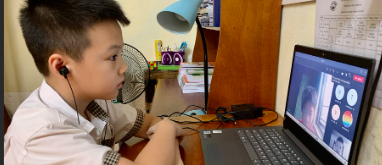Knowing your Students.
Knowing your students makes all the difference.
And the first step is to introduce yourself and learn your students names, however difficult they may be to pronounce. You may want to introduce nicknames if you can’t master the tones of their language.
When you teach English online, you encounter learners from diverse backgrounds with unique needs. You’ll want to understand these differences and tailor your teaching strategies accordingly. For instance, some students might be visual learners while others prefer auditory methods or hands-on activities.
This brings us to the next piece of the puzzle: your virtual classroom. Creating an environment that’s both welcoming and conducive to learning is key. This isn’t just about having a stable internet connection or using a quality webcam; it’s also about the digital tools and platforms you choose. From whiteboard apps to interactive quizzes, the right tech can transform a lesson from mundane to memorable.
Now, let’s talk about cultural sensitivity. You’re going to be engaging with students from around the globe, and each one of them comes from a rich cultural tapestry that shapes their learning perspective. Understanding and respecting these differences are not just professional; they’re essential to creating an inclusive and effective learning experience.
I’m here to help you make those connections between students’ backgrounds and their learning processes. By doing so, you’ll be setting them—and yourself—up for a much more enriching educational journey.
So what comes after setting this foundation for success? You guessed it: engaging them with effective teaching techniques, which is exactly what we’re going to explore next.
Engaging and Effective Teaching Techniques
I’m going to share a secret with you: the best English teachers are magicians. They transform the screen into a stage and captivate their audience with words. How do they do it? Interactive tools, storytelling, and adaptive feedback are their wands.
First up, interactive tools and resources make a huge difference. I’m talking about quizzes, polls, and games that students can participate in real time.
These are not just fun; they’re essential for keeping attention spans hooked. Use platforms like Kahoot! or Quizlet to create dynamic learning sessions that feel like play.
 Storytelling
Storytelling
That brings us to storytelling. Stories carry the power to transport us to different worlds, and they can do the same for your students. Introduce a complex grammatical structure within the context of a captivating tale. You’re going to find out that narrative context makes abstract concepts much more digestible.
Feedback.
I can’t stress enough how important feedback is. This isn’t just about correcting errors. it’s also about praising efforts and guiding students toward self-improvement. Strive for a balance of positive reinforcement and constructive critique. Remember, feedback is a two-way street, encourage students to give their thoughts on lessons as well.
Choose techniques that resonate with you, because your passion will shine through and enhance the learning experience. And don’t worry too much about each session being perfect; teaching is a journey, and you can always adjust your approach down the road.
You can find some of the best FREE online tools here. Free OnlineTools
Sustaining Motivation and Retention.
Keeping students motivated in an online English class can be just as challenging as the teaching itself. But don’t worry too much about it.
I have some strategies that I use that will help you sustain your students’ motivation and thus increase retention over time.
Goal setting with students is more than just a buzzword. it’s a practical way to steer their learning journey. You’re going to find out about the effectiveness of setting clear, achievable objectives that align with their ambitions. This isn’t just about learning English; it’s also about connecting the language skills to their future success.
Building a community online might seem like a lofty goal, but it’s achievable with the right approach. Choose something that resonates with you, whether it’s group projects, discussion forums, or virtual coffee breaks. These approaches foster a sense of belonging and can turn a disparate group of online learners into a tight-knit community.
Lastly
Your first attempt doesn’t need to be your last when it comes to keeping lessons fresh. Just don’t focus too much on perfection. A lot is happening very quickly in the world of online education, and there’s a lot of opportunity to experiment with new content and teaching methods.
Adaptability is your friend here; you can always adjust your approach down the road.
My name is Steve, hope this helps.
If you like this check out my blogs on speech -to -script and script-to-speech tools on my YouTube site.

Please support me on Ko-Fi so I can continue to bring you FREE resources like this.
Any or all links on this site may be affiliate links, and if you purchase something through those links I will make a small commission on them.
There will be no extra cost to you and at times due to my affiliation, you could actually save money.
You can read our full affiliate disclosure here.
Please give me your thoughts, what do you think? Good or bad. Leave a comment below.

